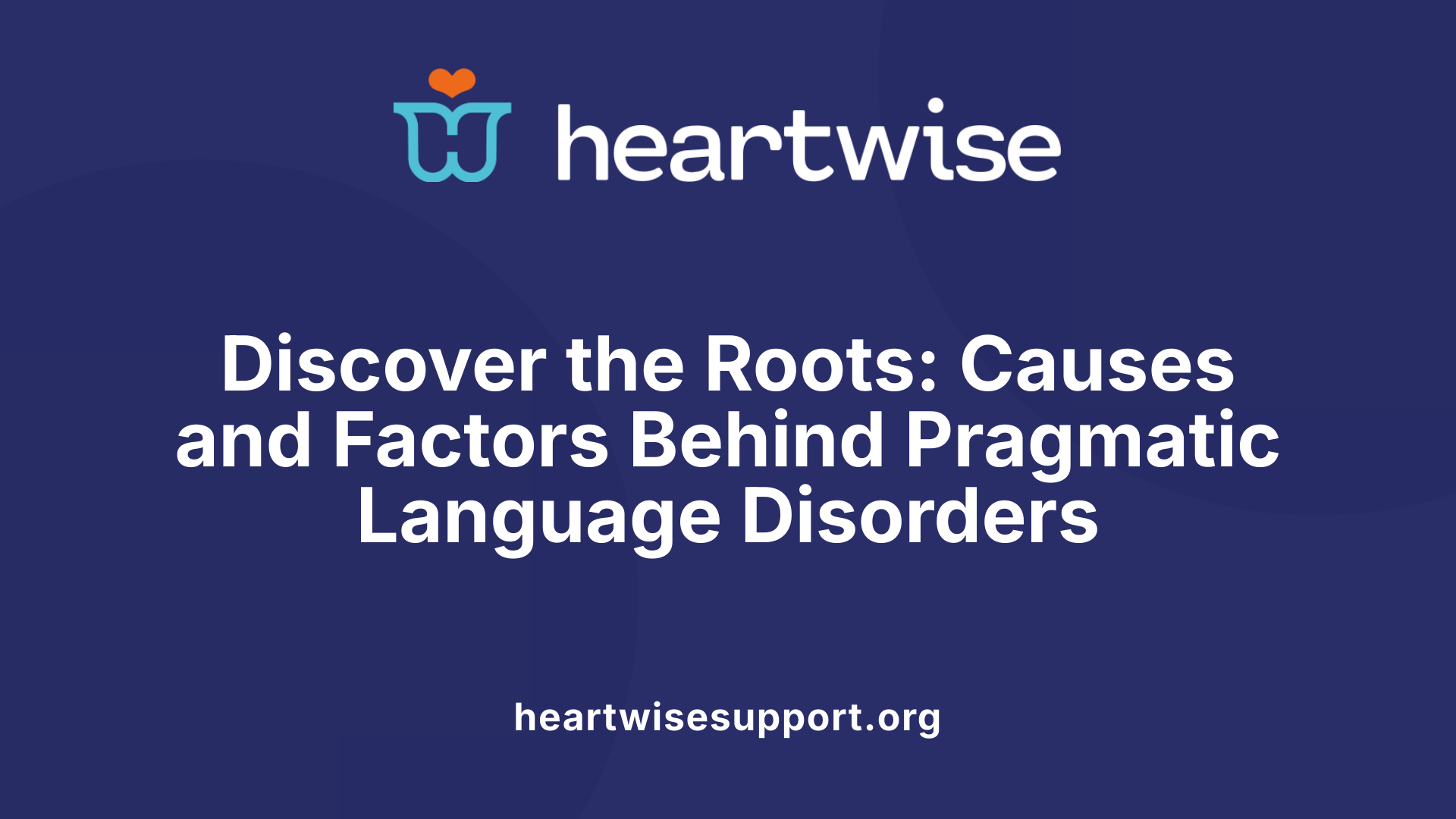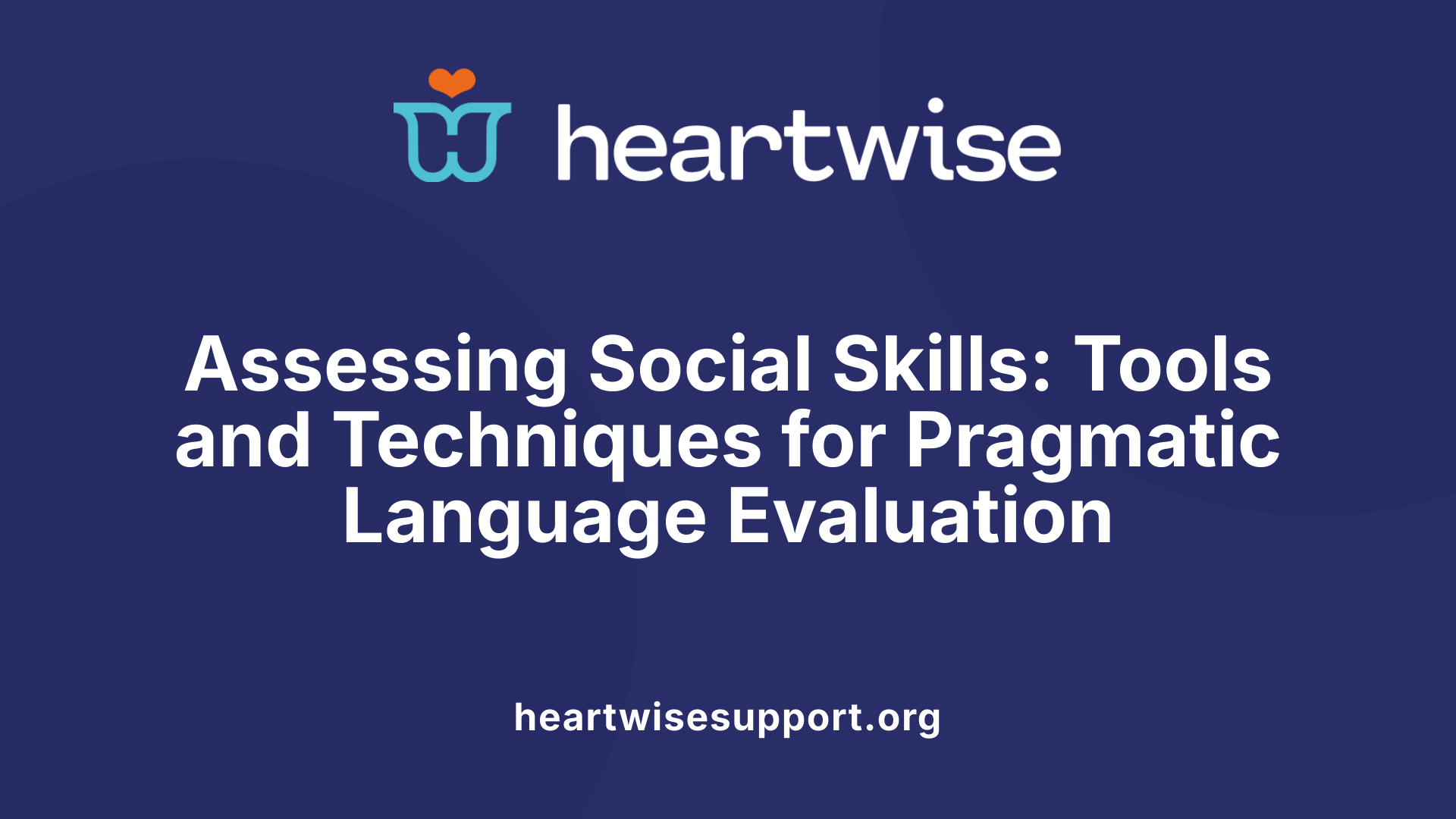Understanding Pragmatic Language and Its Importance
Pragmatic language skills serve as the foundation for effective social communication, enabling individuals to navigate social environments with confidence and clarity. These skills involve the social use of language, including how we initiate, maintain, and conclude conversations, interpret non-verbal cues, and manage social norms. Developing robust pragmatic language abilities is crucial not only for personal relationships but also for academic and professional success, making speech therapy a vital intervention for those experiencing challenges in this area.
What Are Pragmatic Language Skills and Their Role in Communication

What are pragmatic language skills and what role do they play in effective communication?
Pragmatic language skills refer to the social and functional use of language in various contexts. These skills involve the ability to take turns in conversation, interpret non-verbal cues such as facial expressions and body language, and tailor language based on the listener or situation.
These abilities are essential for effective communication because they help individuals convey their intentions clearly and understand others' messages accurately. For example, recognizing sarcasm, humor, or indirect requests requires understanding social cues and adjusting responses accordingly.
Developing strong pragmatic skills supports individuals in engaging meaningfully in social interactions, building relationships, and navigating complex social environments. It involves understanding unwritten social rules, managing conversations smoothly, and recognizing emotional cues.
Proficient pragmatic language skills are vital not only for social success but also for academic and professional achievements. These skills facilitate cooperation, conflict resolution, and emotional regulation, enabling individuals to participate effectively in various settings.
In sum, pragmatic language is a cornerstone of effective communication within social contexts, impacting how people connect, collaborate, and succeed in their personal and professional lives.
| Aspect | Description | Example |
|---|---|---|
| Turn-taking | Knowing when to speak and listen | Sharing speaking turns during a discussion |
| Non-verbal cues | Interpreting facial expressions, eye contact, gestures | Recognizing someone’s happiness or confusion |
| Language adaptation | Modifying speech for different audiences and situations | Using formal language in a presentation, casual speech with friends |
| Conversation management | Initiating, maintaining, and ending conversations | Asking questions to keep a dialogue going |
| Understanding social rules | Following conventions like maintaining eye contact or using appropriate volume | Greeting others politely |
| Interpreting social cues | Recognizing humor, sarcasm, or implied meanings | Understanding a joke or a tease |
Developing these skills significantly enhances social interactions, promotes academic success, and prepares individuals for professional environments, making pragmatic language a fundamental component of effective communication.
Signs, Characteristics, and Challenges of Pragmatic Language Disorders

What are the signs and characteristics of pragmatic language difficulties or disorders in children and adults?
Pragmatic language challenges manifest as struggles in using language appropriately within social settings. Individuals with these difficulties often find it hard to initiate or sustain conversations and may have trouble understanding and employing nonverbal cues such as facial expressions, gestures, and eye contact.
One common sign is difficulty with turn-taking during conversations, which can make social interactions awkward or confusing. Staying on a topic or shifting smoothly between topics can also be problematic. These individuals might interpret or use abstract language, like jokes, sarcasm, or idioms, incorrectly or incompletely.
Additionally, they often have trouble adjusting their speech based on who they are talking to or the context—such as speaking differently with friends than with teachers or colleagues. These challenges can lead to difficulties in forming and maintaining relationships, which impacts social participation and emotional well-being.
In academic or workplace settings, pragmatic language disorders can cause misunderstandings, reduce effective communication, and contribute to social isolation. Young children may not respond to their names or may avoid eye contact, while adults might struggle with social nuances and adjusting their communication style.
Overall, these difficulties influence everyday social functioning, making it tougher to develop friendships, succeed in collaborative environments, or navigate complex social situations.
Interventions like speech therapy and social skills training are effective in addressing these challenges, helping individuals improve their ability to interpret social cues, participate in conversations, and develop better relationships.
More about signs of pragmatic language disorders
Further signs include difficulty understanding jokes or sarcasm, limited use of gestures, and challenges in recognizing social rules, such as taking turns or maintaining eye contact. Recognizing these signs early and seeking professional support can significantly improve social communication skills and overall quality of life.
Seeking help early and engaging in targeted therapy can make a considerable difference in overcoming pragmatic language difficulties and enhancing social interactions.
Causes and Contributing Factors of Pragmatic Language Disorders

What causes or contributes to pragmatic language disorders?
Pragmatic language disorders are primarily linked to neurodevelopmental conditions that involve dysfunctions in the brain's language centers. These disorders often have a genetic component, with family histories of autism or other communication challenges increasing the likelihood of pragmatic difficulties. While the exact causes are still being researched, neurological differences—such as those observed in autism spectrum disorder (ASD), traumatic brain injury, or neurodegenerative diseases—play a significant role.
Environmental factors also influence pragmatic language development. Limited social interactions or early life experiences such as maltreatment can hinder the acquisition of social communication skills. Additionally, early life risk factors like preterm birth, speech and language delays, or emotional and psychological issues can impact a child's ability to develop effective pragmatic skills.
The development of social language skills depends on a complex interplay of biological and environmental influences. For example, children with neurodevelopmental disorders might struggle with understanding social cues, turn-taking, or staying on topic, which are critical elements of pragmatic language. These challenges often stem from an interaction of genetic predispositions, brain development differences, and external social experiences.
Understanding these diverse influences helps professionals tailor assessment and intervention strategies to support children with pragmatic language difficulties effectively. Addressing the root causes often involves multidisciplinary approaches that may include neurological assessments, speech therapy, behavioral interventions, and creating enriched social environments.
In summary, pragmatic language disorders result from an intricate web of neurological, genetic, and environmental factors that all contribute to how a child learns and uses social communication.
For more information, searching "causes of pragmatic language issues" can provide additional insights into this complex area.
Assessment and Evaluation of Pragmatic Language Abilities
 Pragmatic language skills are essential for effective social communication, and their assessment involves a combination of formal and informal methods.
Pragmatic language skills are essential for effective social communication, and their assessment involves a combination of formal and informal methods.
Formal assessment tools are standardized tests designed to evaluate specific pragmatic abilities. These include instruments such as the Test of Pragmatic Language-2 (TOPL-2), which measures skills like turn-taking, topic management, and understanding nonverbal cues. The Children’s Communication Checklist-2 (CCC-2) provides detailed insight into a child's social and language functioning across various contexts. For younger children, the Language Use Inventory (LUI) offers a parent-reported perspective on pragmatic skills. These assessments typically involve direct testing through scenarios and tasks that simulate real-world social interactions.
Standardized tests and checklists serve as benchmarks to compare a child's performance against age-appropriate norms. They help identify specific areas of difficulty, such as difficulty responding to social cues, understanding jokes, or maintaining conversations. These tools often include checklists like the Social Communication Questionnaire (SCQ) or the Pervasive Developmental Disorder (PDD) Checklist, providing a structured overview of social communication strengths and challenges.
Observational and contextual evaluation methods focus on naturalistic assessment. Clinicians observe children in real or simulated social settings, noting behaviors such as eye contact, turn-taking, and the use of gestures. Tasks like Sally-Anne False Belief Tests or the analysis of spontaneous conversations help gauge perspective-taking and social reasoning. Video recordings of interactions allow for detailed review and analysis. These qualitative methods give valuable insights into how children apply pragmatic skills in everyday life.
Overall, the assessment process combines these various tools to develop a comprehensive understanding of a child's pragmatic abilities. Results inform the creation of personalized therapy goals, focusing on skills such as initiating conversations, maintaining topics, and interpreting social cues. Employing multiple methods ensures a thorough evaluation that captures the child's abilities across different social contexts.
Benefits and Outcomes of Speech Therapy for Pragmatic Skills

What are the benefits and outcomes of speech therapy targeting pragmatic language skills?
Speech therapy focused on pragmatic language skills provides many positive results for children struggling with social communication. One of the main benefits is enhanced ability to understand and interpret social cues, such as facial expressions, gestures, and tone of voice. This understanding helps children respond more appropriately in social interactions.
Therapists use engaging activities like role-playing, social stories, and group exercises to give children opportunities to practice conversational strategies. These activities help children learn how to initiate, maintain, and end conversations effectively, which boosts their confidence in social settings.
Children also develop skills like turn-taking, staying on topic, asking questions, and using appropriate volume and tone. Mastering these skills allows children to participate more actively in peer interactions, making friendships easier to form and maintain.
Beyond social skills, speech therapy can lead to emotional benefits, such as reduced frustration and anxiety related to miscommunication. Children often become more independent in social situations and gain improved self-esteem as they experience success in their interactions.
For children with autism spectrum disorder or pragmatic language disorder, targeted intervention is especially beneficial. It helps them navigate social environments more successfully, which can improve their overall quality of life and future opportunities.
In summary, pragmatic speech therapy equips children with the essential social language skills needed for effective communication across different settings, contributing to better social relationships, academic performance, and emotional health.
Strategies, Activities, and Research in Pragmatic Language Development

What strategies, activities, and techniques can be used in therapy to develop pragmatic language skills?
Therapists have a range of methods to help children improve their pragmatic language abilities. These techniques are tailored to each child's specific needs and developmental level.
Role-playing and puppet shows are classic activities that allow children to practice social interactions in a safe, controlled environment. By acting out situations, children learn how to initiate conversations, respond appropriately, and understand social cues like facial expressions and tone of voice.
Social stories are another effective tool. These are short, personalized narratives that illustrate specific social situations and appropriate responses, helping children understand expected behaviors.
Activities such as storytelling, turn-taking games, and collaborative projects promote essential skills like maintaining conversation topics, understanding turn-taking, and recognizing social cues.
Video modeling is a visual technique where children watch videos demonstrating positive social interactions. This reinforces correct language use and non-verbal cues, making abstract concepts more concrete.
Structured social group activities are also highly beneficial. These settings provide opportunities for peer interaction, allowing children to generalize skills learned in therapy to real-life contexts.
In addition, fostering personal awareness through activities that involve asking questions, practicing greetings, and recognizing emotions helps children develop a broader understanding of social communication.
Using a multi-faceted approach that combines these activities and techniques offers the best chance for children to build strong pragmatic language skills that can transfer across various settings.
What activities can help foster pragmatic communication skills?
Engaging children in activities like storytelling and drama play encourages expressive language and understanding of social dynamics. Drawing and painting can be paired with discussions about emotions and social scenarios.
Board games and sports promote turn-taking, cooperation, and understanding rules of engagement, which are crucial for social interactions.
Practicing conversation starters with topics like hobbies, daily routines, imaginary scenarios, and past experiences helps children learn how to initiate and sustain conversations.
At home, parents and caregivers can support pragmatic development by playing pretend and role-playing social situations, teaching greetings, encouraging questions, and practicing appropriate eye contact and volume.
Group-based activities and social skills groups offer structured environments where children can observe peers, practice skills, and receive feedback.
What research and evidence-based practices support pragmatic language development?
Current research highlights that direct and indirect interventions can both be effective in improving pragmatic skills. Parent-child interactions, shared book readings, and peer-led activities are commonly used.
Evidence suggests that combining therapy with natural settings enhances learning and generalization of social skills.
Among the professional approaches, techniques like Social Thinking®, Social Stories™, and social skills training have been supported by research for their positive impact.
While there is variability in studies regarding the most effective method, a trend toward personalized, context-sensitive interventions is clear. This aligns with the neurodiversity paradigm, emphasizing respect for individual differences and strengths.
Furthermore, recent approaches emphasize understanding diverse social perspectives and fostering self-advocacy over rote memorization of social rules. These methods aim to support genuine social understanding and meaningful communication.
In conclusion, employing a combination of evidence-based strategies, engaging activities, and personalized goals creates a comprehensive framework for enhancing pragmatic language skills.
| Approach | Description | Evidence Base |
|---|---|---|
| Role-playing | Simulates social scenarios for practice | Well-supported for enhancing social appropriateness |
| Video Modeling | Uses visual examples to reinforce social cues | Effective in promoting imitation and understanding |
| Social Stories | Personalized stories for context learning | Widely used with positive results |
| Social Skills Groups | Peer interaction in structured settings | Proven to improve generalization |
| Parent Involvement | Home-based activities and coaching | Critical for transfer and consistency |
These methods are part of a broad, adaptable toolkit that therapists, parents, and educators can use to support meaningful development of social communication in children.
The Path Forward: Promoting Effective Social Communication
Improving pragmatic language skills through speech therapy not only enhances individual communication abilities but also positively impacts social relationships, academic performance, and emotional well-being. With evidence-based approaches and a variety of targeted activities, speech-language pathologists can help individuals of all ages develop the social use of language, navigate complex social environments, and foster meaningful connections. Early identification and intervention remain key to maximizing outcomes, and ongoing research continues to refine therapeutic strategies. Emphasizing respect for neurodiversity and tailoring interventions to individual strengths, speech therapy offers a promising pathway toward more inclusive and effective communication for everyone.
References
- [PDF] Pragmatic Language - Speech - Cincinnati Children's Hospital
- 5 Activities to Improve Pragmatic Language Skills in Children
- Understanding Pragmatic Skills Therapy: A Comprehensive Guide
- Setting Pragmatic Language Goals for Speech Therapy
- Building Strong Pragmatic Language Skills - Speech Therapy Talk
- Social Communication - ASHA
- Social Communication (Pragmatics) - Kid Sense Child Development
- How is Pragmatic Language Disorder Treated? - Autism Spectrum
- Pragmatic Language: Building Social Skills for Your Child
- Efficacy, model of delivery, intensity and targets of pragmatic ...











